- Home
- Virginia Hamilton
Zeely Page 2
Zeely Read online
Page 2
Toeboy wasn’t much interested in the canned goods or the cupboards, even if they did reach clear up to the ceiling. But he did want to stand in his bare feet on the cement floor. He took off his shoes and socks hastily, and stood there. The coolness curled his toes.
“I think I’ll just sit on the floor,” Geeder said. She sat down with her back against the wall. She felt comfortable and decided she would sit on the floor for five or ten minutes each day.
Off the pantry there was a pump room.
“What in the world kind of place is this?” asked Toeboy.
“Uncle Ross—Uncle Ross!” Geeder called. He had left so that they could explore again. “Look, come and see this place!”
Uncle Ross came in a hurry, wondering what discovery the children had made in his old, familiar house. Then he saw it was the pump room. It was his favorite place of all.
“Now, you’ve come to something!” Uncle Ross said. “It’s been thirty years since a house was built with one of these rooms.”
“What in the world do you use it for?” Toeboy asked.
“Maybe you won’t want to use it for anything,” Uncle Ross said, “but I come in here when I need a drink of water that’s finer than any other.”
The pump room was quite a small place with just a hand pump attached to a square tub.
“Before there was running water in houses,” Uncle Ross said, “people had pump rooms. There, they filled buckets with ice-cold well water for drinking and for heating on the top of wood-burning stoves.”
Toeboy went up to the pump and cautiously pumped the handle a few times. There wasn’t even a trickle of water.
“The pump has to be primed,” Uncle Ross said to Toeboy. “Go get a pitcher from the dining room and fill it with water from the tap in the kitchen.”
When Toeboy came back with the full pitcher, Uncle Ross showed him how to pour it slowly into the opening around the plunger.
“Now. You pump the handle,” he said to Geeder.
Geeder pumped. Soon, they heard a dry, harsh sound. A minute later, water came gushing out.
“Have a drink,” Uncle Ross said. He took a tin cup from a hook by the door and filled it, first offering it to Geeder and then to Toeboy.
“Oh!” Geeder said. “That’s just the sweetest water!”
From that moment on, they refused to drink the perfectly good water from the sink in the kitchen and feasted in the pump room on well water cold as ice.
The rest of the house was large and spread out. Geeder supposed all farmhouses were like that. Her favorite place was the parlor; it was silent, with blinds and curtains drawn to keep out the heat.
Standing in the room, she didn’t know she had begun to talk to herself. “Look at all those old pictures,” she said. Photographs, yellow with age, lined the walls and the tops of tables. “I’ll bet that one is Uncle Ross when he was a boy. And that one is him for sure as a young man. I don’t even have a memory of those other people. Probably Uncle Ross doesn’t either, the pictures are so old.”
There was a large photograph of a woman she knew to be Uncle Ross’ wife, Aunt Leah. She was no longer living.
“She’s awfully pretty,” Geeder whispered. “I wish I could have known her.”
The parlor had comfortable chairs, a sofa with many soft pillows and tables with drawers full of candy. Some of the candy tasted as though it had lain in the drawers for years, but Geeder ate it anyway. There was an upright piano against the far wall, away from the windows.
“I think I’ll just play it once,” Geeder said. She sat down on the piano bench and touched the keys gently. The sound came forth muted, as if it had waited a long time. The soft tone thrilled her.
“I can play a few songs a little bit.” She spoke more to the piano than to herself. “I wish I could play well. I wish I knew a lot of pretty songs that would just fill up this room!”
A breeze pulled the blinds in and out against the window screens. The lace curtains were sucked up and down along the blinds, making a queer sound all of a sudden. Geeder felt a chill creep up her neck. The photographs seemed to look through her, as though she were a stranger.
She got up and, not looking back, flounced out of the room. “There’s nothing you can do with an old piano,” she said.
She wandered into the hall, where there was a cherry-wood staircase. She had noticed it when she first came into the house. Uncle Ross had said it was new, that the old one had fallen down in a heap a long time ago. It led, curving gently around, to the bedrooms above. The stairs had been in the back of her mind ever since she sat down at the piano. And the banister was the kind of thing she could touch and know.
“Better than old, yellowed photographs anytime,” she said. She tried sniffing the banister. “It smells just like the tallest tree in the woods!”
Upstairs, she and Toeboy had separate bedrooms on opposite sides of a long corridor. Her room had a large, soft bed, a bureau with a mirror that she could turn any way she wished and two antique cherry-wood chairs with silk cushions. She opened her suitcase and put all her clothes away in the closet and bureau. At the bottom of the suitcase was a box full of the rest of her necklaces. These she hung from the bedposts and the backs of the chairs. When she lay on the bed, the necklaces made her feel that she rested among stars.
Across the room from the bed were windows that looked out on the rear yard, a big, empty barn and a smaller shed.
Since he no longer farmed, Uncle Ross kept no livestock about. There was just a fenced-in yard at the side of the house for the chickens.
Soon, Geeder got up from the bed and left her room. Slowly, she went over the whole house. Uncle Ross was somewhere outside, and she supposed Toeboy was with him. She had no one to bother her and could take her time. She went to Toeboy’s room. His bed was large like hers and his windows looked out over the front yard and the high hedge that shielded the house from the road. She put all Toeboy’s clothes away and stacked his books neatly on the floor by the bed.
“We’ll have to get a bookcase for all these books,” she said, “or he’ll have them scattered from one end of the house to the other.”
She went to Uncle Ross’ room. “I don’t suppose he’d mind if I just look in,” she said. “I won’t touch anything.” She crept inside, careful not to make a sound, nor to bump against any furniture. Uncle Ross’ room was much larger than hers and Toeboy’s. He had a long, wide desk by the windows. There were many photographs on it, too. Geeder was pleased to find a picture of herself and Toeboy. “Now when was that taken—and who took it?” She couldn’t recall posing for the picture. But she noticed at once that she and Toeboy were no bigger than babies. “Oh, the last time we were here,” she whispered, “when we played silly games!”
Geeder walked around Uncle Ross’ room several times, taking in everything she saw. All around her was a faint scent of sachet. It smelled the same as the photographs on Uncle Ross’ desk looked—old, dry, clouded and dusty.
“I smell cigars, too,” she whispered, “and soap and—my goodness—hay!”
Geeder stood still in the room, then slowly backed out of it. A chill crept up her neck.
“Oh,” she said. “Old things. Waiting for something new to happen.”
She walked slowly down the winding staircase, gently holding on to the cherry-wood banister. Downstairs, she stopped in the pump room for a drink of water. When she had finished, she sighed with satisfaction and went quickly outside.
Sunlight hit her full in the face. Heat, with the scent of grass, blew in her nostrils. “Toeboy! Where are you? It’s hot as blazes!”
She found Toeboy digging in the rich, black soil by the barn. He had found a squirming colony of earthworms. “Here, let me attach them,” Geeder said. She tied the worms together, carefully, so as not to harm them. The worms wiggled. She and Toeboy laughed.
“They’ll make a nice octopus for Uncle Ross’ pond,” Toeboy said.
“The pond!” Geeder had not remembered it. �
��Toeboy, let’s get going!”
The pond was far back on Uncle Ross’ land, in a pie-shaped section behind his west field. The section had never been much good for farming. Sycamore trees grew at random in it, and in the middle of these was the pond. It was not a deep pond, but it was good for wading up to the waist. They took off their clothes and waded in, heedless of the cold. When they had had enough, they put on their clothes again and sat dangling their feet in the water.
Geeder looked out through the trees, listening to sounds of trucks on the road which passed the house. She could even hear people talking a long way off. She imagined she heard what went on in town—people shopping and saying hello. It was then that she thought to rename the town.
“I’ll call it Crystal,” she said to Toeboy. “If you stand on the road, you can probably see the beginning, the middle and the end of it, just the way you can see through a piece of glass.”
Geeder thought about the road. It curved for a mile through Crystal and then wound away from the town around a forest of catalpa trees to Uncle Ross’ farm.
“Leadback Road! That’s what I’ll call it,” she said. “Because where does it lead to?”
“Here!” Toeboy said.
“That’s right!” Geeder said. “Crystal has a crack in it, Toeboy, and the crack is Leadback Road!”
4
THE FIRST DAY AT the farm, Geeder and Toeboy looked over the hogs in Uncle Ross’ west field. These were no ordinary animals, but prize razorback hogs owned by a Mr. Nat Tayber and his daughter, who rented the land from Uncle Ross.
“Look at the size of those hogs!” Toeboy said.
“They’re big, all right,” Geeder said, “and they’re mean. I wouldn’t get too close to them even if I had to.”
They leaned on the fence, looking in at the hogs. The hogs wallowed around, eating and rooting in the earth with their snouts. Often they came close to the fence but veered away as they caught the scent of Geeder and Toeboy.
“Let’s go,” said Geeder. “I don’t believe they like us here.”
They fed a bit of corn to Uncle Ross’ two hundred leghorn chickens. They could feed them as much corn as they liked, Uncle Ross had said. And they could gather up eggs whenever they had a mind to.
“Well, it’s the truth. I can do whatever I want,” Geeder said to herself. Still, not one thing had taken place that fit with her father’s words “And now, I leave it all to you.”
That was why, when evening came, Geeder decided to spread sheets and blankets out on the front lawn. She and Toeboy would sleep outside and maybe they would see a comet.
Toeboy liked looking up into the sky, as long as Geeder was talking. The sound of her voice made the night less strange and he felt safe. He had made his bed partly beneath a sprawling lilac bush close to the house. Geeder had made hers near the high hedge that shielded the house from the road. Toeboy felt so good that he decided to get up and make his bed next to Geeder’s.
“I think I’ll come over there,” he called to her.
“Better not,” she said. “Just better stay where you are.”
“But I want to sleep by the hedge, too,” he said.
“I know one thing,” Geeder said. “Late at night in the country, night travellers walk along dark roads.”
“What?”
“Night travellers,” Geeder said again, “and they usually come up when you’re just about asleep.”
“What kind of things are they?” asked Toeboy. He dug his legs deeper among the branches of the lilac bush.
“I’ll tell you this,” Geeder said. “If you see one, you’d better close your eyes fast and dive as far under the covers as you can go. They don’t like kids watching them. In fact, they don’t like anybody watching them!”
Toeboy stayed uneasily beneath the lilac bush. He was glad to be so near the house, for if he heard any sound, he could race inside. He did not mind at all seeing half stars and a half-moon through the lilac leaves.
Geeder turned around to see what Toeboy was doing and saw that he had pulled most of his bedding all the way under the lilac shrub. That nearly made her laugh out loud. She had made up the whole thing about the night travellers. She was only trying to frighten Toeboy—not for any really mean reason, but just because he was little and was easy to scare. As far as she knew, nobody walked late at night along this dark road.
But maybe ghosts do, she thought. A chill passed up her spine and she closed her eyes tight for an instant to make it go away.
“Toeboy,” she called, “are you still awake?”
“I’m awake,” he said. “I don’t want to sleep yet.” He lay fingering the cool leaves of the lilac.
“Then I’ll tell you all about stars,” said Geeder, “since you’re so wide awake.”
Geeder talked about the stars and the night. She knew Toeboy had gone to sleep when he no longer asked her anything or chuckled about what she said.
A long time passed. Geeder dozed and awoke with a start. The grass beyond the tip of her toes was wet with dew. She pulled the blankets more tightly around her, tucking her feet safely inside. She had closed her eyes again when she heard a rustling sound on Leadback Road.
Some old animal, she thought. The sound grew louder and she could not think what it was. Suddenly, what she had told Toeboy flashed through her mind.
Night travellers! She dove under the covers.
But something’s happening! she told herself, poking her head out again.
It took all her courage to crawl out of the covers and the few feet over the wet grass up to the hedge. She trembled with fear but peeked through the hedge in spite of it. What she saw made her bend low, hugging the ground for protection. Truthfully, she wasn’t sure what she saw. The branches of the hedge didn’t allow much of a view.
Something tall and white was moving down the road. It didn’t quite touch the ground. Geeder could hear no sound of footsteps. She couldn’t see its head or arms. Beside it and moving with it was something that squeaked ominously. The white, very long figure made a rustling sound when she held her breath. It passed by toward town.
Geeder watched, moving her head ever so slowly until she could no longer see it. After waiting for what seemed hours, quaking at each sound and murmur of the night, she crept back to bed, pulling the covers over her eyes. She lay, cold and scared, unable to think and afraid even to clear her dry throat. This way, she fell asleep. She awoke in the morning, refreshed but stiff in every muscle.
5
GEEDER LAY FOR A MOMENT, watching mist rise from the pink, sweet clover that sprinkled the lawn. The air smelled clean and fresh and was not yet hot from the sun.
“I’ve got to decide,” she whispered. In the stillness, the sound of her own voice startled her. She turned carefully around to see if Toeboy had stirred. The tangled bedding deep in the lilac bush did not move.
“If I tell Toeboy about the night traveller,” she whispered, “he might not want to sleep outside any more. Just think of it! Not more than a few hours ago, an awful, spooky thing walked by here!”
Geeder wasn’t at all sure she wanted to sleep outside again, herself.
“Goodness knows what a night traveller will do if it sees you watching! Maybe I’d better tell Uncle Ross. . . . Maybe I shouldn’t.”
Geeder knew it would take her a while to figure out what course to take. Almost any minute now, the people Uncle Ross rented land to would come down the road. Uncle Ross had said they came every morning as soon as the sun was well up in the sky. It was just about time, and watching them would be something to do.
When her dew-soaked blankets grew warm from the sun, Geeder whistled for Toeboy as softly as she could. Turning around, she saw one eye peek out from the lilac bush.
“Wake up, Toeboy!” she whispered loudly. “I think I hear them coming!”
Toeboy leaped up before he looked where he was going and hit his head against a branch. Leaves spilled dew all over him. He was wet and still half asleep when Geeder yank
ed him to the ground before they could be seen.
They knelt low by the hedge. Trying not to move or blink an eye, they watched Mr. Tayber and his daughter come into view along Leadback Road. What they saw was no ordinary sight. They watched, spellbound, for nothing in the world could have prepared them for the sight of Miss Zeely Tayber.
Zeely Tayber was more than six and a half feet tall, thin and deeply dark as a pole of Ceylon ebony. She wore a long smock that reached to her ankles. Her arms, hands and feet were bare, and her thin, oblong head didn’t seem to fit quite right on her shoulders.
She had very high cheekbones and her eyes seemed to turn inward on themselves. Geeder couldn’t say what expression she saw on Zeely’s face. She knew only that it was calm, that it had pride in it, and that the face was the most beautiful she had ever seen.
Zeely’s long fingers looked exactly like bean pods left a long time in the sun.
Geeder wanted to make sure Toeboy noticed Zeely’s hands but the Taybers were too close, and she was afraid they would hear her.
Mr. Tayber and Zeely carried feed pails, which made a grating sound. It was the only sound on the road besides that of Mr. Tayber’s heavy footsteps. Zeely made no sound at all.
You would think she would, thought Geeder, she was so long and tall.
Geeder and Toeboy stayed quiet as the Taybers passed, and the Taybers gave no sign that they saw them hiding there. Uncle Ross had said that they were not known to speak much, even to one another. They had not lived in Crystal always, as Uncle Ross had.
Geeder and Toeboy watched the Taybers until they went out of sight. It was then that Toeboy said, “Let’s go watch them in the field.”
“No,” said Geeder quietly, “no, Toeboy.” She could not possibly have made him understand how stunned she had been at seeing Miss Zeely Tayber for the first time. Never in her life had she seen anyone quite like her.

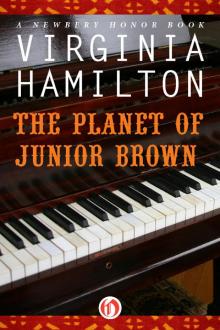 The Planet of Junior Brown
The Planet of Junior Brown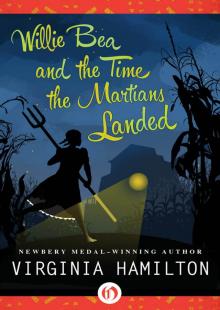 Willie Bea and the Time the Martians Landed
Willie Bea and the Time the Martians Landed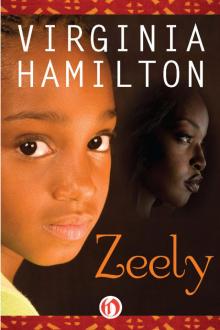 Zeely
Zeely Bluish
Bluish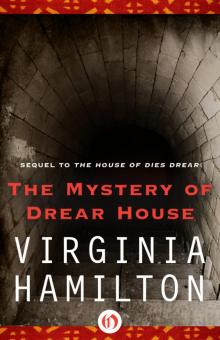 Mystery of Drear House
Mystery of Drear House M.C. Higgins, the Great
M.C. Higgins, the Great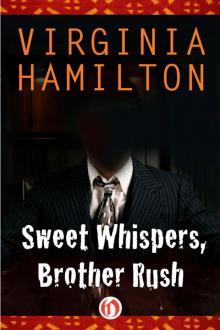 Sweet Whispers, Brother Rush
Sweet Whispers, Brother Rush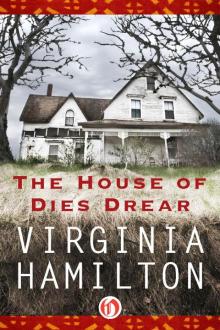 The House of Dies Drear
The House of Dies Drear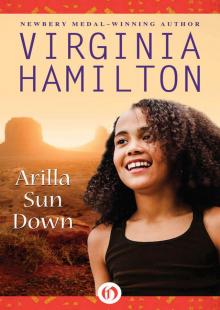 Arilla Sun Down
Arilla Sun Down Cousins
Cousins